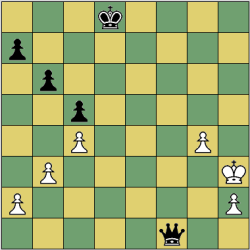When is it appropriate to resign in amateur chess?
 I am planning to start again playing "live" chess games on FICS since a few weeks. Tuesday night I finally found some time for a reasonable slow (20 30) game. After about one hour, I found myself playing white with the position shown here and about 1 minute left on my clock (take a look at the annotated game if you are curious how the game started). I came to the decision that my chances for getting one of my pawns promoted are practically zero and resigned.
I am planning to start again playing "live" chess games on FICS since a few weeks. Tuesday night I finally found some time for a reasonable slow (20 30) game. After about one hour, I found myself playing white with the position shown here and about 1 minute left on my clock (take a look at the annotated game if you are curious how the game started). I came to the decision that my chances for getting one of my pawns promoted are practically zero and resigned.I frequently read phrases like "she/he did the honorable thing and resigned" or complains about somebody who did not resign in a position that was hopeless (at least from the opponent's point of view) and forced the game to continue. On the other hand, I also see opinions like "nobody ever won by resigning". A quick internet search found 13 ways of the uneasy art of resigning and good "advice" on how to resign gracefully. I can understand that most chess masters resign quickly when they loose material. But when should amateurs resign? I think that it is rather impolite to force somebody to play through a long ending when it is pretty much clear who won. However, players on my level make mistakes, and in most games not only one. Therefore, I could always fight on and hope that my opponent messes up. For sure I won't resign right after loosing a minor piece. In the particular case shown here, though, I did not see much of a chance to win, not to mention the fact that I was getting hungry... But I'd like to learn how other people decide when to resign and why, so please leave a comment about your experience with this topic!


6 Comments:
It's up to you when to resign, some people won't, I think I read somewhere were some coaches tell their scholastic players never to resign.
I'll resign when I think I'm lost, which includes me having no chances for cheapos, tricks, etc. My thinking is that I don't want to come to regret resigning later, so I have to be pretty darn sure I'm lost before I do it... if that makes sense
It's a touch choice indeed, and a good topic for blogging. I run into this situation often, but I like to play it a bit further as well. There have been cases where I've been in a losing position and in a few extra moves, realized I had some great potential. I may have still lost in the end, but had a small mistake been made on the other end, I might have won.
There's another case where I was playing in a live game and I won my opponent's Queen. I expected a resignation because I was in a very strong position, but none was forthcoming. I started to get a little "fancy" and not realizing it, left my Queen unprotected and lost it. Really dumb. The game went on to a draw.
On the other hand, I hate battling through a long game when there's really no hope.
In general, I'll hold off resigning for at least a few moves (maybe 5) after I feel that resigning is the thing to do. That way, if things take a sudden turn for the better, you're still in the game. You haven't really lost anything by playing a few more moves.
If you still think you can pose a threat (be it timewise or materialwise) you should just keep going. Resign when you feel it is hopeless to go on.
I would like to add that it is sometimes hard to eveluate a position as lost. Unless you are a GM perhaps... Let's say you only have your King left, and you are facing King+Queen of your opponent. Even then there is the possibility of a stalemate (thus a draw). Like i said; Only resign when your feeling tells you to. It might be annoying to your opponent, but as with tactics, you should also face a lot of seemingly lost positions in order to eveluate a position as lost. If you still think you can get something out of a certain position, try it. Let it be part of your learning process.
Thanks for all the comments! Summarizing what I learned from this advice:
1) Better fight on than give up too easily. Particularly, one should not give in to the impulse to resign right after a blunder. After all, the probability to make mistakes is higher after a blunder - at least I always tend to panick a little after loosing a piece...
2) Even after making the decision to resign, why not playing a few more moves to see if a chance comes up?
3) Keep the clock in mind. If your opponent has only little time left, the flag may fall before he/she gets to checkmate.
4) You don't learn anything from resigning.
Said that, I think one of the reasons why masters resign relatively early when they are behind is, that they often play in long tournaments and want to preserve their energy for the next game. This shouldn't be an issue for me.
http://s95395959.onlinehome.us/public/chess/knowwhentoresign.jpg
my opponent was offering a draw until the very end. i decided to create a design with my spare pieces. :)
Post a Comment
<< Home